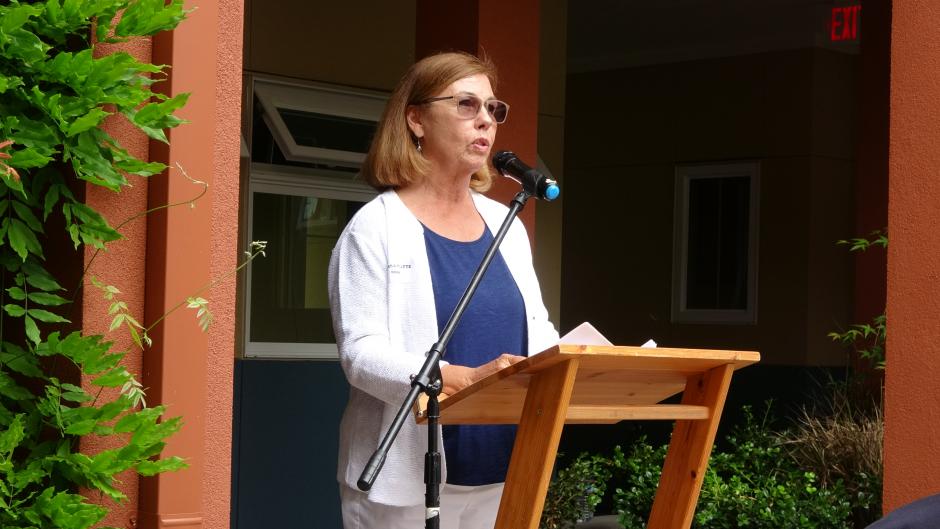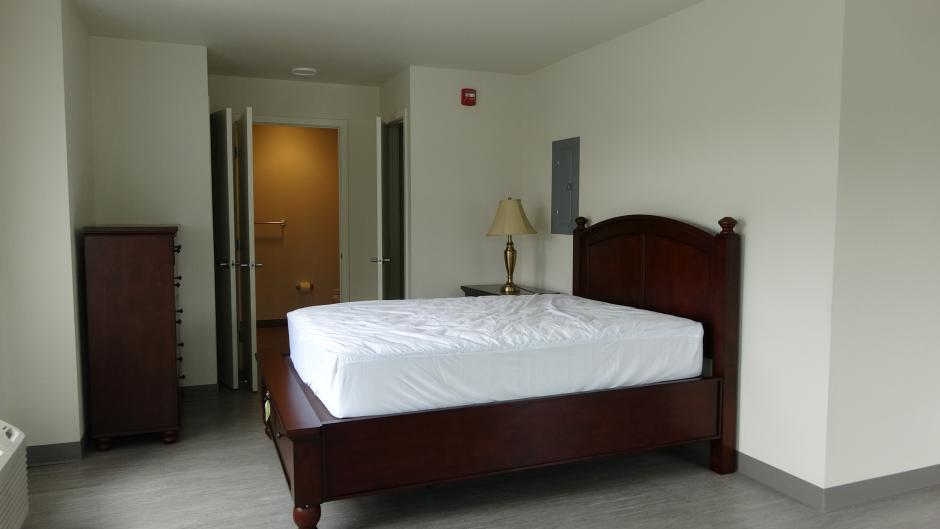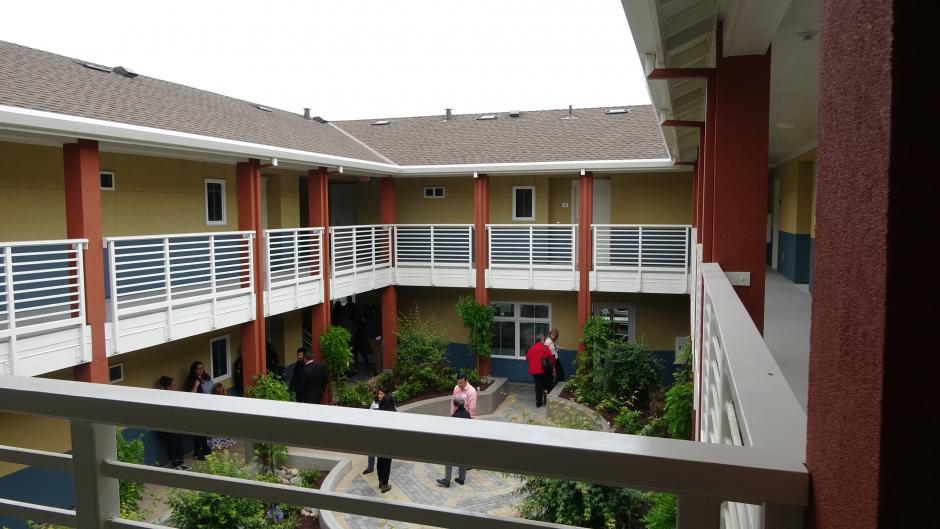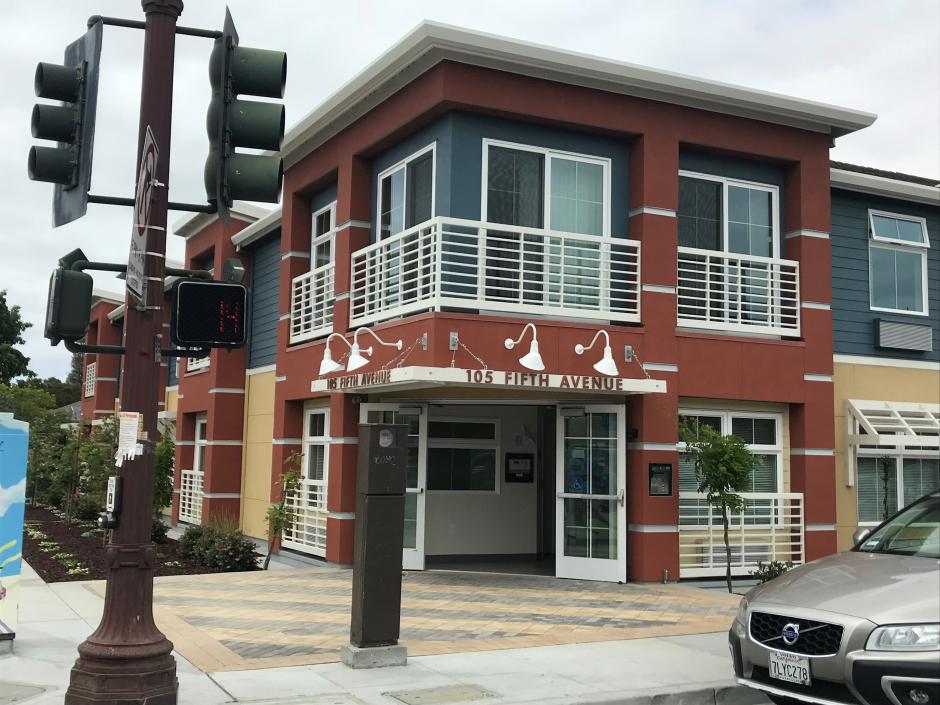Waverly Place Opens its Doors
Supportive Housing for Chronically Homeless Clients
Waverly Place Apartments, the long-awaited supportive housing complex operated by the Mental Health Association (MHA) in Redwood City for homeless individuals living with mental health issues, hosted its grand-opening ceremony on May 23, with much celebration and community support.
Through a coordinated entry system, Waverly Place houses 15 clients, who meet a specific set of criteria, including being seriously mentally ill, chronically homeless and having completed a thorough background check. There is also one on-site case manager living at the property.
 Waverly Place is funded in part through
San Mateo County’s Mental Health
Services Act Housing Program, which has funded 62 supportive
housing units across 6 housing developments in the county.
Supportive housing is an evidence based practice that enables
individuals to live independently in affordable housing with a
level of service that allows the person to maintain housing,
obtain stability both in physical and mental health and
participate in a supportive community.
Waverly Place is funded in part through
San Mateo County’s Mental Health
Services Act Housing Program, which has funded 62 supportive
housing units across 6 housing developments in the county.
Supportive housing is an evidence based practice that enables
individuals to live independently in affordable housing with a
level of service that allows the person to maintain housing,
obtain stability both in physical and mental health and
participate in a supportive community.
Individuals who have received supportive housing services show improvement in their health status and behavior in the community, and remain permanently housed.
Services provided are based on the individual’s goals and needs and can include independent living skills, medication support and management, crisis intervention, case management, supportive employment, on-site community activities and more.
Among the speakers who shared kind words and congratulations at the ceremony, were Supervisor Dave Pine, Health System chief Louise Rogers and MHA executive director Melissa Platte.
“To create housing in San Mateo County is one of the most difficult things that I can think of,” said Supervisor Dave Pine, as he commended Waverly Place partners on their vision, perseverance and collaboration. “We all need a home. We all need a place where we can feel secure – a place where we can build our life around, and the individuals who have a chance to live here will have that, and it will have profound benefits for them.”
Community input remained an important part of the process throughout the development of Waverly Place, which was proposed back in 2013. Despite great progress in recent years, stigma surrounding mental health issues persists and community support for this project was at times hard-won. Some community members were wary of what an influx of individuals with mental health issues would do to their property values and sense of security.
 Their fears were assuaged as a dialogue
developed among community members, clients and behavioral health
experts. While this was a months-long process, according to MHA
site manager Georgia Peterson, it was incredible to witness the
change in people’s perspective through education about behavioral
health issues and supportive housing.
Their fears were assuaged as a dialogue
developed among community members, clients and behavioral health
experts. While this was a months-long process, according to MHA
site manager Georgia Peterson, it was incredible to witness the
change in people’s perspective through education about behavioral
health issues and supportive housing.
As Waverly Place residents begin to settle into their new homes, peer support will be a vital part of the experience. The new Residential Assistance Mentorship Program (RAMP) pairs individuals with peers who have experienced and overcome homelessness. Mentors help clients navigate some of the challenges that come after housing is taken care of, like navigating local food pantries and locating other community resources.
Resident Assistance Mentor Jereme Buress spoke about his experience transitioning into housing after being homeless for almost 20 years.
 “When I was homeless, I believed what
people thought of me: that I wasn’t worthy of housing or that I
wasn’t worthy of being inside.” He stressed the importance of
leaning on one’s support system when the transition gets rough.
“When I was homeless, I believed what
people thought of me: that I wasn’t worthy of housing or that I
wasn’t worthy of being inside.” He stressed the importance of
leaning on one’s support system when the transition gets rough.
Jereme closed off the ceremony with some advice for the new residents of Waverly Place Apartments, “So for each of you who is moving into Waverly Place Apartments or any supported housing, I encourage you to use the support that is offered. Use the opportunity to heal, and to give your body and mind a chance to heal. Forget what’s behind you and don’t worry about tomorrow. Enjoy the now, take it easy on yourself and get well.”
